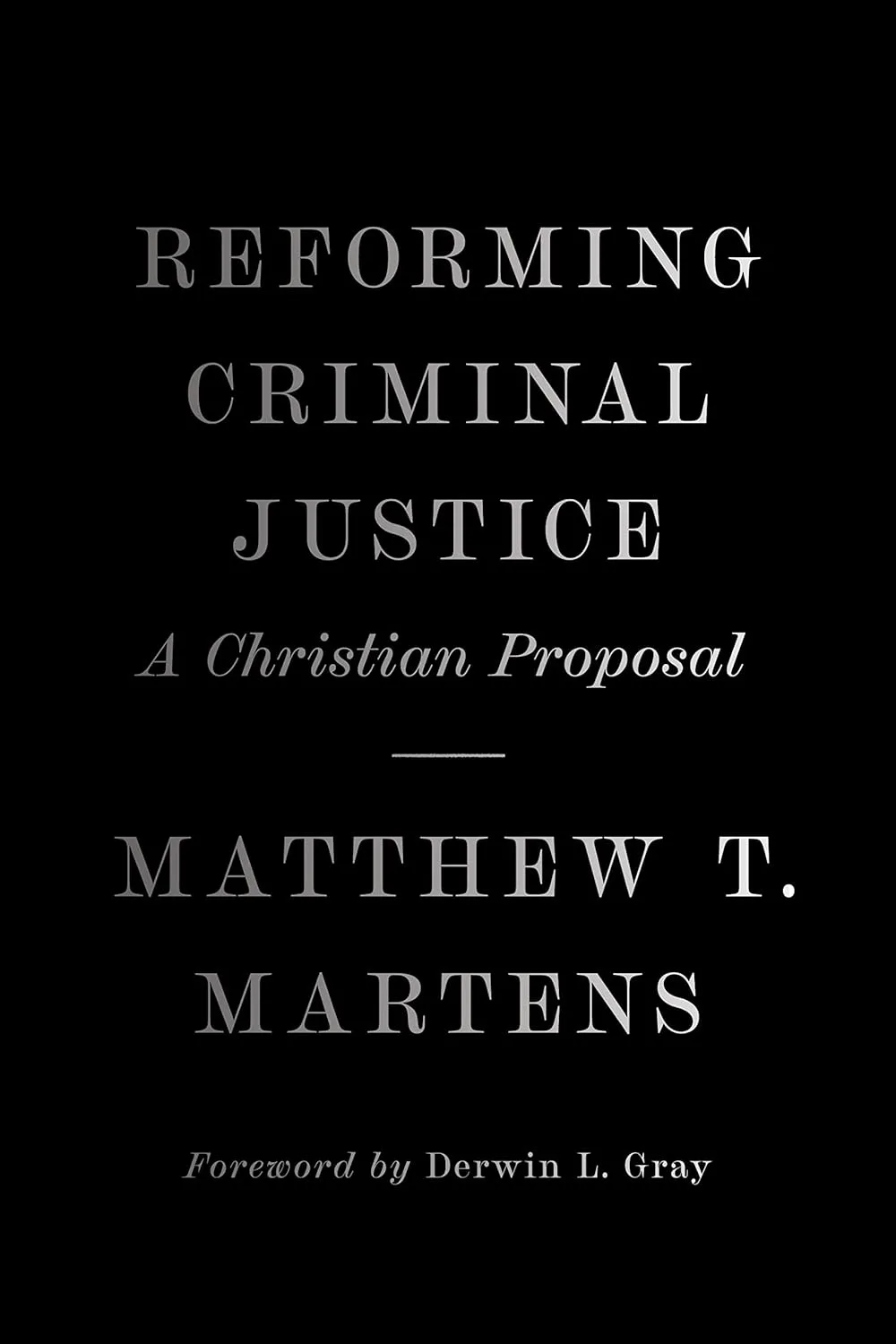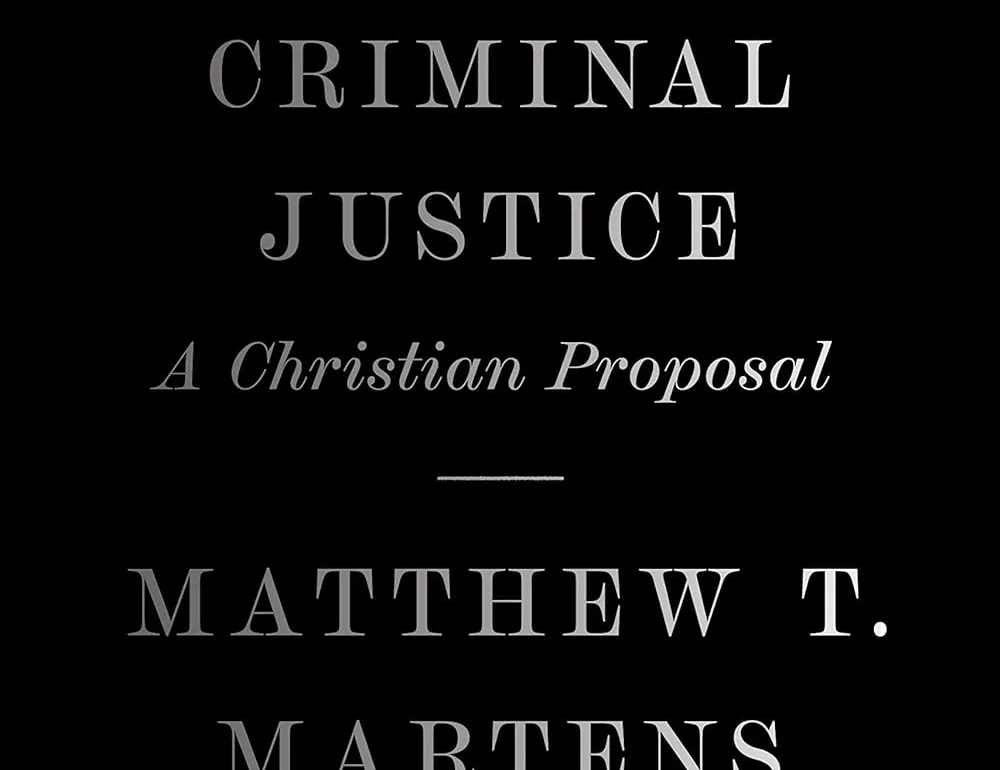O. J. Simpson. Scott Peterson. Amanda Knox. Casey Anthony.
Sometimes the world stops to watch the criminal justice process, agonizing over what each witness says, how the judge instructs, and if the prosecutor will offer a plea deal. Normally though, we don’t give a second thought to the system by which we hold others accountable.
In Reforming Criminal Justice: A Christian Proposal, Matthew Martens weaves together Scripture to form a standard for criminal justice and evaluates the American system in light of it. Martens’s analysis springs from his experience as a clerk for a United States Supreme Court justice, as a federal prosecutor, and as a criminal defense attorney, and from his theological studies at Dallas Theological Seminary and Gordon-Conwell.
Despite Martens’s prestigious résumé, this book isn’t meant for only lawyers or theologians. Martens seeks to guide every citizen to understand that true justice is a form of neighbor-love, which should inspire efforts at reforming our criminal justice system.

Reforming Criminal Justice: A Christian Proposal
Matthew T. Martens
Reforming Criminal Justice: A Christian Proposal
Matthew T. Martens
Using his theological training Martens reveals how Scripture provides several guideposts (accuracy, due process, accountability, impartiality, and proportionality) for loving our neighbors as it relates to criminal justice. Then, drawing on his near quarter century practicing criminal law, he examines how America’s justice system falls short of the biblical standard. By understanding how our current system operates and considering how love of neighbor relates to issues of crime and justice, we will be better equipped to seek true Christian reform of the justice system.
Blind, Biblical Justice
The first half of the book lays out the biblical framework on which Martens builds the rest of his analysis. He’s clear from the first words that justice is love––love for both the victim and the criminally accused. He argues the justice system is most likely to be just when its framers assume they could be either the victim or the accused.
Martens walks through aspects of justice according to Scripture, proposing a biblical theology of accuracy, due process, accountability, impartiality, and proportionality. He argues criminal justice is “state-sponsored violence” that’s sanctioned by Scripture (4). As such, when our justice system fails to uphold the biblical standards, the result is injustice that violates God’s law.
While not everyone will find themselves as a victim or accused, Martens shows that we all bear responsibility for how the justice system works.
While not everyone will be a victim or accused of a crime, Martens shows we all bear responsibility for how the justice system works. Our call to love our neighbor includes working to set the situation right even though we didn’t cause the hurt.
I’ve been a prosecutor in my hometown for 11 years and handled every type of case you’d imagine in a small town—and several you never would. I’ve seen justice served and frustrated. I’ve questioned the way things were done and sought to do the right thing every day. I disclose more than the law requires and make every effort to fight fair. I’ve prosecuted individuals whose sentence lengths exceed their lifespans and others who thanked me for changing their life paths. Sometimes justice is served better through getting the defendant help than getting him or her convicted. My perspective on this vocation and the justice system has been shaped by my professional training and my profession of faith.
My faith is part of everything I do, but Martens brought a new focus to my role in the criminal justice system. His work helped me critically evaluate my role in the criminal justice system through the lens of my faith, pushing as hard as saying I should quit my job if I cannot meet the high standard of loving both neighbors—the victim and the criminally accused—while doing it.
Problems with the Modern System
The American justice system is imperfect. The second portion of Reforming Criminal Justice walks the reader through the system from beginning to end, evaluating it according to the biblical standard. For Martens, concern for justice must start well before a crime is charged. He argues it must begin when laws are created and continue through to the way appeals are considered. Injustices only compound as imperfect laws are enforced by imperfect people through imperfect processes.
The detailed description of the justice system will likely be illuminating to most readers. Several points of Martens’s descriptions rely heavily on his experience in the federal system, so some of the procedural details vary from what people experience at the state level. However, there’s enough overlap to make his analysis helpful.
Martens discusses some of the historical failings of the American criminal justice system, especially how African Americans have been treated after the abolition of slavery. Martens critically examines laws created to target blacks, how felon disenfranchisement disproportionately affected African American men, and how the systemic exclusion of black citizens from juries all worked together to produce gross injustice that has long-term social implications.
Some problems with the system are so wide spread that they affect almost every single case.
Some problems with the system are so widespread they affect almost every single case. For example, plea bargaining is viewed by most lawyers as a necessity for the modern system to continue moving, based on the current allocation of resources. As Martens states, “Roughly 95 percent of criminal cases are resolved through guilty pleas” (201). While not all plea agreements are wrong, the potential for coercion casts shadows on these agreements. For example, when a defendant is unable to make bail, the “combination of pretrial detention and a trial date a year or more away can exert incredible pressure on a defendant” (207). An overloaded justice system can make a plea bargain appear to be the best choice for both accused and prosecutor as a way to move cases through the system in a timely manner.
I’ve tried about 30 jury trials and a half dozen bench trials, and resolved nearly 10,000 cases by plea agreement. Some cases linger years before going to trial, especially when the defendants are out of custody. Martens affirms what I see reflected in my day-to-day work: the desire to create system-wide change is only a dream without the allocation of substantial government resources by funding more judges, more prosecutors, more public defenders, and higher pay for private attorneys appointed to handle indigent defense.
Advocacy for Biblical Justice
Some of Marten’s seemingly obvious solutions for implementing biblical justice could increase partiality in the system without a complete overhaul of the rules and laws. For example, I struggle with his advocacy for the universal application of the Old Testament’s two-witness rule.
He argues the modern justice system isn’t released from the requirement for the testimony of two witnesses to convict, though he sees the Old Testament law as providing a principle of justice rather than a strict command. For example, he allows modern forensic evidence to stand in for a second witness. Ultimately, he urges his reader to never convict without two witnesses. He recognizes the application of this principle will prevent some victims from getting justice on earth, so he encourages them to lean into the hope of eternal justice.
Modern courts don’t operate under the same rules as biblical processes did, so applying the two-witness rule in the modern context becomes clunky. In most cases, modern rules of evidence prevent the prosecution from introducing prior acts or bad behaviors consistent with the crime charged. They may require that instances of child abuse or child rape on different victims are charged separately even when committed by the same defendant. Reforms must be implemented carefully and holistically so well-intentioned changes don’t create new injustices.
Reforms must be implemented carefully and holistically so that well-intentioned changes do not create new injustices.
Martens’s advocacy for biblical justice is powerful, but it must be applied to the whole system, not simply to the most obvious inconsistencies, to ensure impartial justice. We cannot ignore the two-witness rule and the reasons it was set in place, but we must be cautious about cutting and pasting it into the modern context without further guidance. This is a tough topic to wrestle with, and one Martens might give further attention to in the future. There are no easy answers, but he does point us in the right direction.
Reforming Criminal Justice does more than develop a framework of what Christian justice should look like; it tells the reader how to get there. And not just me as a prosecutor. It stirs up the reader to want to take action and lists practical paths to effect change. Those who read Reforming Criminal Justice will walk away changed: determined to be part of the justice rolling down love for their neighbors (Amos 5:24).



